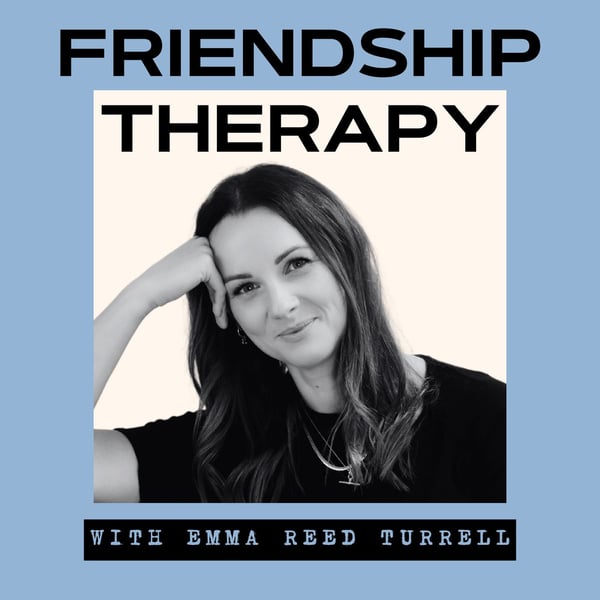S1, Ep 10 BITESIZE Friendship Therapy: Compound Loss - how fear, hope, love and sadness can co-exist
Friendship Therapy
Emma Reed Turrell
4.8 • 1.2K Ratings
🗓️ 5 July 2024
⏱️ 19 minutes
🧾️ Download transcript
Summary
On Monday's episode, Rachel bravely opened up about the loss of her father two years ago. It was a bereavement that, in her words, 'shone a light' on the friends who were willing to get in the trenches with her, and those who couldn't meet her where she was.
For Rachel, the death of her dad signified the end of an incredibly difficult six months since his re-diagnosis, during which she had to contend with the inevitable arrival of her very worst fear, and the loss of the hope that she had been holding on to since she was a 12 year old girl making wishes on birthday candles. The losses that Rachel had experienced since she was a child gave her a sense of vigilance that stayed with her into adulthood, causing her to feel fearful of change, particularly within her friendship groups.
In this bitesize episode, Emma explores where Rachel's fear of loss and endings originates from and how it is showing up in her friendships now, with the help of the blind spot profiles in her latest book, What am I Missing? Emma also explains the concept of 'compound loss' in therapy and how we can begin to navigate it, and why fear, hope, love and sadness exist most productively when we allow them to co-exist.
Find out more about the blind spot profiles: https://www.penguin.co.uk/books/454959/what-am-i-missing-by-turrell-emma-reed/9780241624982
If you’d like to apply to appear on the podcast in season two, please click the link below to fill out the form:
https://forms.gle/owsfs6DVxVdTMFo46
---
Friendship Therapy is hosted by Emma Reed Turrell, produced by Chris Sharp and Lauren Brook.
---
Social media:
Emma Reed Turrell @emmareedturrell
Friendship Therapy @friendshiptherapypod
Email: [email protected]
Transcript
Click on a timestamp to play from that location
| 0:00.0 | Hello and welcome to this bite-size episode of Friendship Therapy |
| 0:05.0 | following a conversation I had the honor of having with Rachel on Monday. |
| 0:10.0 | She very bravely and openly and generously told us all about how the loss of her father |
| 0:19.7 | to cancer two years ago everything that had to teach her about friendship. |
| 0:25.0 | And I think there's so much for us to unpack together today that I want to keep us on topic in that way about grief and loss in friendship. |
| 0:37.0 | One of the things that Rachel had experienced was a very challenging relationship with loss. By the time she was 12, her |
| 0:47.9 | father had his cancer diagnosis. He recovered, but not without challenging treatment and adjustments made. |
| 0:56.0 | Her parents then separated, which was another loss of a different sort. |
| 1:02.0 | And as Rachel came to tell us she then spent the next decade. |
| 1:09.7 | We're living with a fear of loss actually and fear of loss is often more challenging |
| 1:16.8 | than loss itself. Well we talked about it in the terms of Rachel being a rock, and for anyone who is interested |
| 1:27.8 | to learn more about BlindSpot Profiles and what I mean when I say a rock, what am I missing is the book that I published in April and you might |
| 1:36.0 | find that you get to identify some of your blind spot profile particularly around friendships but |
| 1:41.0 | also around loss because it's going to have an impact on us. |
| 1:44.9 | One of Rachel's qualities as a rock was this idea of her being in early friendship groups, the mother hen, the organizer, the comforter, the provider, she was the one that pulled it all together and made it happen. |
| 2:02.0 | She was the adult in her friendship groups, which is no surprise |
| 2:07.6 | because Rachel is also an only child and whilst it's a generalization my experience as a clinician is often that working with an only child we find that well they grew up really quick |
| 2:18.0 | because the center of gravity in a household with an only child is often that there are more adults than children in a two-parent |
| 2:25.3 | family or at least that there is an equal relationship if it is a single parent family that there |
| 2:32.1 | isn't the same child |
| 2:33.6 | centricity that naturally develops when there is a household with |
| 2:37.4 | multiple children. So what we find is perhaps the activities are more adult led, perhaps the food or the |
... |
Transcript will be available on the free plan in -271 days. Upgrade to see the full transcript now.
Disclaimer: The podcast and artwork embedded on this page are from Emma Reed Turrell, and are the property of its owner and not affiliated with or endorsed by Tapesearch.
Generated transcripts are the property of Emma Reed Turrell and are distributed freely under the Fair Use doctrine. Transcripts generated by Tapesearch are not guaranteed to be accurate.
Copyright © Tapesearch 2025.

